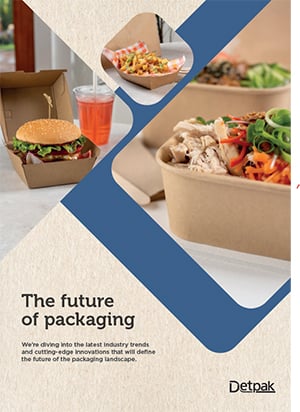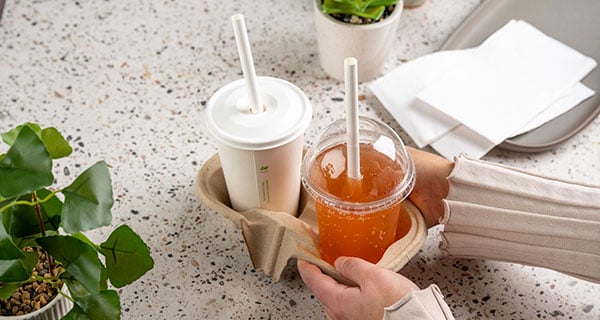While most people want to know what goes into the food they’re eating, have you ever wondered what’s in the food packaging itself?
As it turns out, there could be more to your food packaging than meets the eye. Recent studies and regulatory assessments have shown that PFAS chemicals are present at very low levels in the general Australian food supply, with overall exposure considered minimal and unlikely to pose public health risks, especially regarding immune system impacts. Read on to learn more about PFAS, their environmental impact and the steps we’re taking at Detpak towards more sustainable, no-added PFAS food packaging.

Environmental impact of PFAS
Added PFAS pose a concern to the environment for a number of reasons, from their persistence and bioaccumulation to their potential toxicity, which is subject to ongoing investigations. Here are just some key aspects of the environmental impact of PFAS:
• Persistence: PFAS are highly persistent in the environment, meaning they don’t break down easily over time. And because they’re able to move freely through soil, water and animals, they can lead to long-term contamination.
• Bioaccumulation: PFAS have the ability to accumulate in living organisms. This bioaccumulation occurs as PFAS are absorbed by plants and animals from the surrounding environment. In aquatic ecosystems, PFAS can accumulate in fish and other organisms, potentially leading to higher concentrations as they move up the food chain.
• Contamination of water sources: PFAS can contaminate groundwater and surface water. Industries that use or produce PFAS, as well as areas where firefighting foams containing PFAS have been used, are often common sources of water contamination.
• Global reach: PFAS have quickly become a global environmental issue. Due to their ability to move easily through water sources and soil, they’ve been detected in remote areas far from their original sources of production or use. This widespread distribution indicates the global impact of these substances and the need to move away from products containing added PFAS.
Addressing the environmental impact of added PFAS requires a combination of regulatory measures, responsible waste management practices and the development of safer alternatives to these substances. Ongoing research is essential to better understand the full extent of the environmental consequences and to identify effective strategies for mitigation and remediation. With this in mind, it’s best to err on the side of caution by taking proactive steps to reduce your exposure to PFAS and minimise the chance of PFAS ending up in the environment.
As regulations continue to target harmful chemicals, businesses are shifting towards no added PFAS packaging solutions. The industry is moving toward safer alternatives that prioritize both food safety and environmental impact. Choose our single-wall hot cups for a sleek and sustainable coffee solution.
Human Health Concerns
The potential impact of PFAS on human health is a growing concern, with research linking exposure to a range of health issues such as certain cancers, reproductive challenges, and effects on the immune system. Recognising these risks, the Australian government has established comprehensive guidelines for the investigation of PFAS contamination, ensuring that any presence of these chemicals in the environment is thoroughly assessed. State and territory governments are actively developing robust management plans to manage PFAS contamination and protect public health. National coordination is being strengthened to ensure that timely and relevant information about PFAS is available to all Australians. The Australian Government works closely with relevant authorities, including the Australian Packaging Covenant Organisation, to reduce the use of PFAS in food packaging and other products. These collaborative efforts aim to manage PFAS contamination effectively and safeguard the health of communities across the country.
National Regulations and Guidelines
To address the challenges posed by PFAS, the Australian government has implemented a range of national regulations and guidelines designed to manage and reduce PFAS contamination. The Industrial Chemicals Environmental Management (Register) Instrument 2022 (ICHEM Register) lists specific PFAS compounds and signals a potential legal ban on PFAS in food packaging in Australia by 2025. The establishment of the PFAS National Coordinating Body supports consistent chemical management practices and provides expert guidance on how to safely manage PFAS. The Australian government has also released a national framework that defines PFAS broadly and sets out clear guidelines for the investigation and management of PFAS contamination. State and territory governments are working to implement these guidelines, developing robust management plans to manage PFAS contamination and reduce environmental risks. Efforts are underway to establish national standards for PFAS management and support consistent regulation across Australia, ensuring that all levels of government are aligned in their approach to protecting the environment and public health from the risks associated with PFAS.


Moving towards No Added PFAS packaging
There are currently no set regulations surrounding the use of PFAS. The PFAS group covers more than 4,700 substances and current legislation makes it incredibly challenging to regulate chemicals on a group basis. However, the Australian Packaging Covenant Organisation (APCO) has announced a voluntary, industry-led Action Plan to ‘Phase Out of PFAS in Fibre-Based Food Contact Packaging.
As an APCO member and responsible manufacturer, Detpak are now in the process of replacing added PFAS materials and products within our Australian supply chain in line with APCO’s suggested PFAS Action Plan timeline. This voluntary action plan supports Australia's efforts to reduce PFAS contamination and protect the environment.
Regulatory and industry collaboration is essential in managing PFAS in food packaging. Local governments, alongside federal and state bodies, play a key role in implementing safety practices and standards related to PFAS to ensure public health and environmental protection.
As part of our efforts to eliminate added PFAS in food packaging, we’ve introduced our Vanguard® range by Eco-Products®. This sugarcane packaging range uses proprietary alternative compounds to achieve oil and grease resistance, without the addition of harmful PFAS chemicals. The Vanguard® range is also GreenScreen Certified™ Silver, which means that the PFAS-alternative formulation does not contain any other chemicals of high concern.
The Vanguard® range includes a variety of food packaging options, including moulded fibre clams, bowls, portion cups and plates. Each product in the Vanguard® range shares the same size specifications as the traditional range of Eco-Products sugarcane, ensuring a smooth transition between products and the same fit-for-purpose. Removing the added PFAS chemicals can reduce the level of grease resistance, so we recommend testing in your own operating environment.
At Detpak, we offer a range of sustainably sourced packaging options to help eliminate packaging waste. That way you can make a positive impact on the environment by using sustainable packaging materials. Make the switch to no added PFAS food packaging today and explore Detpak’s Vanguard® range from Eco-Products.




